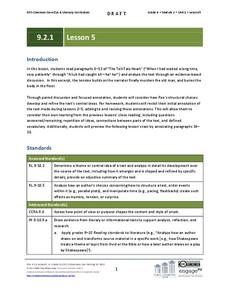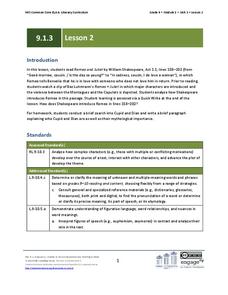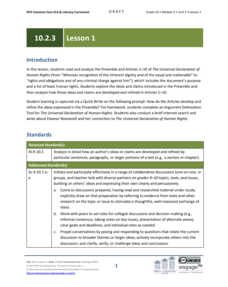Curated OER
My Secret War: Lesson 1
Fifth graders explore historical fiction. In this genre study lesson, 5th graders go on a text feature scavenger hunt to identify the parts of a historical fiction text. Additionally, students read the book, My Secret War and discuss...
EngageNY
Grade 9 ELA Module 3, Unit 1, Lesson 5
Ninth graders study the study of animals in an informational text lesson plan that focuses on analyzing text structure. As learners continue reading the first chapter of Temple Grandin's Animals in Translation, they form inquiries and...
Curated OER
Exploring the Sky: Reading Maria's Comet
Discover the science behind astronomy. After reading the book Maria's Comet, which is about a young woman who breaks new ground by becoming a female astronomer, young learners practice reading comprehension with...
EngageNY
Grade 10 ELA Module 1: Unit 2, Lesson 12
As the class concludes its close reading of “The Palace Thief,” groups consider how the narrator's character has changed throughout Ethan Canin’s short story.
NPR
Young And Brave Lesson Plan
Honor brave young women with a instructional activity that showcases 30 individuals who's achievements made a lasting impression on our country's history. Here, scholars randomly choose a person to examine from an interactive myseum...
EngageNY
Grade 9 ELA Module 3, Unit 1, Lesson 9
Keeping animals relaxed and comfortable has numerous benefits. Explore Temple Grandin's unique perspective on animal behavior with a lesson that concentrates on a central idea within the text. High schoolers prepare for the final...
Curated OER
Lesson 3: Labeled Diagrams
Examine the book Stargazers by Gail Gibbons. Young readers will practice reading and interpreting information from diagrams in this informational text. They work together as a class on this skill and then move into independent...
EngageNY
Grade 9 ELA Module 2: Unit 1, Lesson 5
Eager readers have waited a long time, very patiently, for a set of literary analysis lessons that connect text structure to the work's central idea. As ninth graders continue reading "The Tell-Tale Heart," they focus on the central...
EngageNY
Grade 9 ELA Module 4, Unit 1, Lesson 22
Class members read "Satyagraha," the concluding section of Marc Aronson and Marina Budhos' Sugar Changed the World: A Story of Magic, Spice, Slavery, Freedom, and Science, and analyze how the authors support their claim that terrible...
iCivics
Lesson 3: Bias
How do journalists balance bias and ethical reporting? The final lesson in a series of five from iCivics examines the different types of bias and how they affect the news we read. Young reporters take to the Internet to find examples of...
Teaching for Change
A Documents-Based Lesson on the Voting Rights Act
How did the Voting Rights Act affect the daily lives of American citizens? A document-based lesson developed by the Student Non-Violent Coordinating committee (SNCC) presents a case study of the impact of the Voting Rights Act of 1965 on...
EngageNY
Grade 9 ELA Module 1: Unit 3, Lesson 2
After viewing a clip from Baz Luhrmann’s Romeo + Juliet in which major characters are introduced, and the violence between the Montagues and the Capulets is depicted, the class reads Act 1, Scene 1, lines 158-202. Groups then analyze the...
EngageNY
Grade 9 ELA Module 2: Unit 1, Lesson 6
It may not be 4 o'clock in the morning when you have ended these labors, but it's still time to work on textual analysis. Study the resolution of Edgar Allan Poe's "The Tell-Tale Heart" through the thematic lens of guilt and confession,...
EngageNY
Grade 9 ELA Module 2, Unit 2, Lesson 10
The slow curse of realization begins to sink in during the tenth lesson in a literary analysis unit on Sophocles' Oedipus the King. Ninth graders carefully read the selected lines for evidence of Oedipus' feelings during a turning point...
EngageNY
Grade 10 ELA Module 4: Unit 3, Lesson 3
What's the difference between men and princes? Machiavelli discusses this distinction in chapter 18 of The Prince. Scholars first listen to a masterful reading of the chapter. Then, they write about how the author develops a central idea...
EngageNY
Organizing an Opinion, Reasons, and Evidence: Text 1 for Each Expert Group
Working in small groups, scholars continue reading an informational text about either Roberto Clemente or Althea Gibson. As they read, pupils create graphic organizers in their journals to help map their ideas logically.
Curated OER
Organizing Research
Before sending your third graders to the library, help them build a solid foundation for their research with this plan. Following the "I do, we do, you do" method, the teacher starts by modeling how to create a research question and...
EngageNY
Grade 9 ELA Module 1: Unit 3, Lesson 13
Readers examine the conversation between Friar Laurence and Romeo in Act 3, scene 3 of Romeo and Juliet and consider how Shakespeare's word choices impact the development of Romeo's character.
EngageNY
Grade 9 ELA Module 2: Unit 1, Lesson 3
Hearken! and observe how well a literary analysis unit can help ninth graders read closely and connect text structure to a central idea. Focusing on Edgar Allan Poe's "The Tell-Tale Heart," learners take notes and track the development...
EngageNY
Grade 9 ELA Module 2, Unit 2, Lesson 3
The manipulation of time is one of the most essential elements in Sophocles' Oedipus the King. As your language arts class participates in a jigsaw discussion activity, they work together to analyze the play's plot structure and...
EngageNY
Grade 10 ELA Module 2: Unit 3, Lesson 1
Scholars examine the Universal Declaration of Human Rights and analyze the ideas in the preamble. Readers define new vocabulary words, listen to a Masterful Reading, answer questions in pairs, participate in a jigsaw discussion, and...
ReadWriteThink
"Three Stones Back": Using Informational Text to Enhance Understanding of Ball Don't Lie
"Three Stones Back," a passage from Matt de la Pena's best-seller, Ball Don't Lie, allows readers to practice their close reading skills as they compare the passage to an information text about wealth inequality.
iCivics
Lesson 2: Misinformation
Fake news is a hot topic right now ... but what is it? Intrepid young investigators track down the facts that separate journalistic mistakes and misinformation through reading, research, and discussion. Part three in a five-lesson series...
iCivics
Mini-Lesson: Presidential Pardons
How do United States presidents give people second chances? Scholars research the concept of presidential forgiveness, or pardon. By completing an Executive Branch Mini-Lesson, class members get a better grasp of the power the executive...

























